#history of racism
Note
One of the most surprising things I learned recently is that Bernie doesn’t do well with Black voters, and I was wondering if you knew why that is? I feel like his platform is fairly popular so I just wonder why he fails to win their votes?
It's because Black Democrats a) like actual Democrats, and b) also don't have time to waste with empty moral posturing when they are intimately aware of how public policy and progressive (or reactive/reactionary) politics affect their everyday life, in a way that a lot of privileged white Bernie Bros were utterly unequipped to consider (and indeed, attacked the Black Democrats for "not knowing what's best for them," which is not paternalistic or racist at all!) Black Democrats also know how important voting is, because of the obvious fact that they were disenfranchised, had their political accomplishments totally dismantled at the end of Reconstruction, had to literally fight through dogs, gas, guns, and screaming white supremacists to exercise their vote and win their civil rights in the 1960s, and are consistently targeted today by white Republicans attempting to gerrymander, restrict, penalize, or otherwise eradicate their rights. Black Democrats don't vote for empty performative politics, they vote for results. Bernie is great at one, and very bad at the other. Three guesses which.
Elderly Black Democrats in South Carolina allegedly "saved" Biden's 2020 campaign (after Bernie had done well in the EXTREMELY white Iowa and New Hampshire primaries; the ordering of the primaries and the excessive prognostications attached to Uber White Midwestern/New England Results is dumb, but anyway). And that was because Black Democrats have good reason to like Biden. He spent eight years willingly supporting and never upstaging the first Black president, he picked the first Black/Asian woman as his vice president, he put the first Black woman on SCOTUS, he has spent years championing their concerns at an actual tangible and legislative level, and they know that they can trust him. By contrast, Bernie is one of those leftists who dismisses all other kinds of oppression as secondary to the class struggle and thinks that racism, sexism, misogyny, etc. are all inferior injustices to economic injustice. And yes! Economic injustice is very much a thing! But if you go around telling marginalized communities to their faces that their many, many years of lived experience with racial oppression isn't as "real" as economic injustice, and/or that racism will magically be solved by economic redress and you don't need to do anything else about it, don't be surprised when that is not a winning message.
Besides, and as noted: Bernie has spent fifty years in politics and achieved nothing really meaningful (unlike Biden, who has also been in politics for fifty years and has real and significant legislative accomplishments as senator, vice president, and president). His policies are on-paper progressive, but Black Democrats and Black people in general aren't a monolithically progressive voting bloc, and have other concerns and issues that intersect with their support (or lack thereof) for him. There are very few Black people who can afford to take their vote for granted, or to vote for somebody who hasn't demonstrated any interest in going through the legislative process to achieve real results, and instead spends most of his time talking loudly to left-leaning white progressives and cultivating a "Only I, Great Bernie, Can Solve Your Problems" political mentality, which then spills into sore loserdom and was an issue in both 2008 and (most visibly and unforgivably) in 2016.
Basically, in my view, Bernie mostly exists to be the totem for a certain subset of privileged white leftists to club the Democratic Party over the head and set impossible standards of what they "should" be doing, which in turn actively undermines support for the Democrats and helps nakedly fascist Republicans win more elections. And despite nominally running as a Democrat, he in fact is not a Democrat (he sits as an independent) and makes no effort to court central Democratic constituencies. Of which, and obviously, African-Americans are one of the greatest parts, due to consistently voting to get this country out of the mess that fascist white people keep trying to plunge it into. Any candidate who does not understand that, and does not make serious efforts to do so, likewise should not be taken seriously. Therefore, no matter how mad it makes his frothing internet stans (who likewise are not serious people with actual political opinions), the Democratic party apparatus has no real need to humor him and his self-aggrandizing constant talking about things that he never, ever actually does shit about.
142 notes
·
View notes
Text
Ethnic Diversity in the Middle Ages
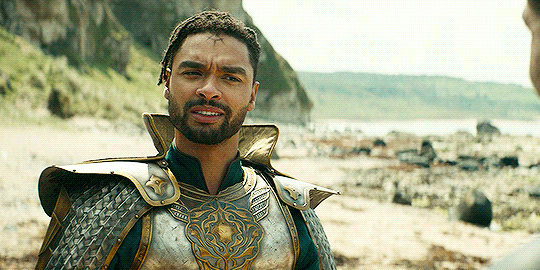
The other big thing a lot of whiny white fanboys tend to cry about when it comes to fantasy and historical medial is the existance of non-white people within medieval Europe. Which to me still is just... silly. If you know anything about European history, you should not believe something like that.
Because here is the thing: The Roman Empire also included quite a lot of Northern Africa. Where, you will not believe it, Black and Brown people lives. Who then would at times become citizens of Rome and would take over jobs within the Roman Empire. The most notable group might be the Nubian mercenaries, who were counted among the best military forces in the ancient world. As such the Roman army often took them along while they were colonizing Europe. And as it was with those things... Some of those Nubians ended up settling throughout all of Europe.
It should be noted that we have both historical evidence from Roman times, though, as well as archeological evidence that shows us that there were Black and brown people living both on the British isles and in parts of Scandinavia even prior to Rome. And no, we do not know where those came from. We just know they were there.
But even other than that... Medieval Europe was not a computer game with invisible walls. Africa was there. Asia was there. And people traded.
I said it before: The first European sources about Japan we have are from about 300 AD from a Roman merchant, who has travelled to China and then heard about the Japanese islands. It is also one of the few sources we have of someone talking about the indigenous people of Japan.
But yes, people travelled. People traded. We all hopefully know about the silk road. The trade route that went throughout Asia and ended in Europe. All sorts of stuff was traded here - and people travelled, too. And at times they ended up staying whereever they travelled to. Maybe because weather or health did not allow them to travel back, maybe because they found community in the place they travelled to.
And yes, people traded with Northern Africa, too. Now, subsaharan Africa is a different story. Yes, some people crossed over from there. But most of the trade with those areas happening during the last two centuries of the medieval period.
It also should be reminded that indeed the Mohrs ruled over Iberia throughout most of the medieval period, with reconquista only happening at the very end of the middle ages.
And of course Europe was also raided and invaded several times by the Ottomans, the Huns and the Mongols. Of whom some remained behind in Europe, too.
All of this is not to say that medieval Europe was as ethnically diverse as modern Europe is. It was not. But it was also not all white (which is of course without even going into the fact that the concept of whiteness did not yet exist).
Oh, and also realize that racism as we know it today was not really a think for at least the early medieval period. It only started to develop through the crusades (which is to say from 1100 AD forward). Something that was however a thing is religious discrimination and violence against religious minorities, which is to say mostly against jews and muslims. These especially took off, once the crusades started, but happened even before that. Which is also why a lot of Jews from Europe fled either west, to Iberia, or east, to the Ottoman empire, as muslims at the time did not discriminate against them in the same way.
#history#medieval history#middle ages#medieval#european history#diversity#cultural diversity#ethnic diversity#history of racism#fantasy#high fantasy
14 notes
·
View notes
Text

"Police brutality has been a defining controversy of the modern age, brought into focus most readily by the murder of George Floyd in Minneapolis and the mass protests that occurred as a result in 2020. However, the problem of police brutality has been consistent throughout American history. This volume traces its history back to Antebellum slavery, through the Gilded Age, the Progressive Era, the two world wars and the twentieth century, to the present day. This handbook is designed to create a generally holistic picture of the phenomenon of police brutality in the United States in all of its major lived forms."
#uwlibraries#history books#african american history#american history#history of policing#history of racism
6 notes
·
View notes
Text
"I can't wait till these old racists finally die off."

The decision comes despite recent revelations about an unserved arrest warrant and the 87-year-old Donham’s unpublished memoir.
The Rev. Wheeler Parker, Jr., Emmett Till’s cousin and the last living witness to Till’s Aug. 28, 1955, abduction, said Tuesday’s announcement is “unfortunate, but predictable.”
“The prosecutor tried his best, and we appreciate his efforts, but he alone cannot undo hundreds of years of anti-Black systems that guaranteed those who killed Emmett Till would go unpunished, to this day,” Parker said in a statement.
“The fact remains that the people who abducted, tortured, and murdered Emmett did so in plain sight, and our American justice system was and continues to be set up in such a way that they could not be brought to justice for their heinous crimes.”
Same as it ever was.
#Emmett Till#racism#history of racism#united states history#structural racism#watchmen#watchmen meme#dr manhattan
26 notes
·
View notes
Text
17/12/23 this masterlist has been completely, vetted, revamped and reformatted with free access to all reading and viewing material. It will be updated and edited periodically so please try and reblog the original post if you're able.
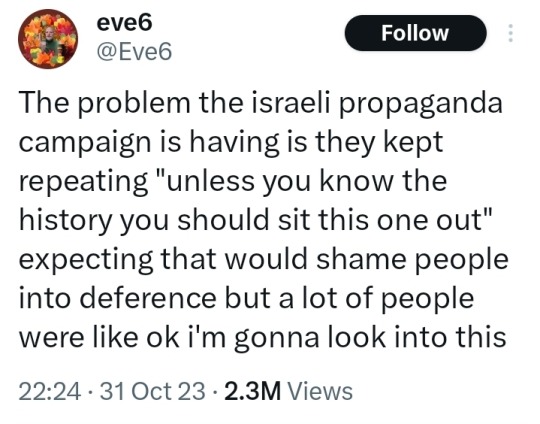
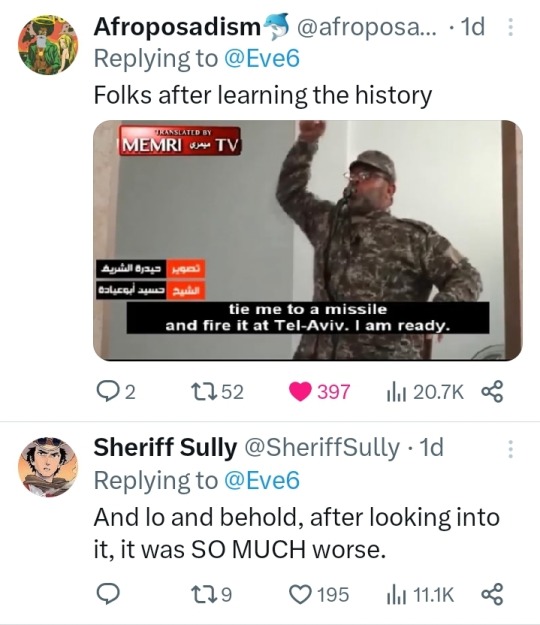

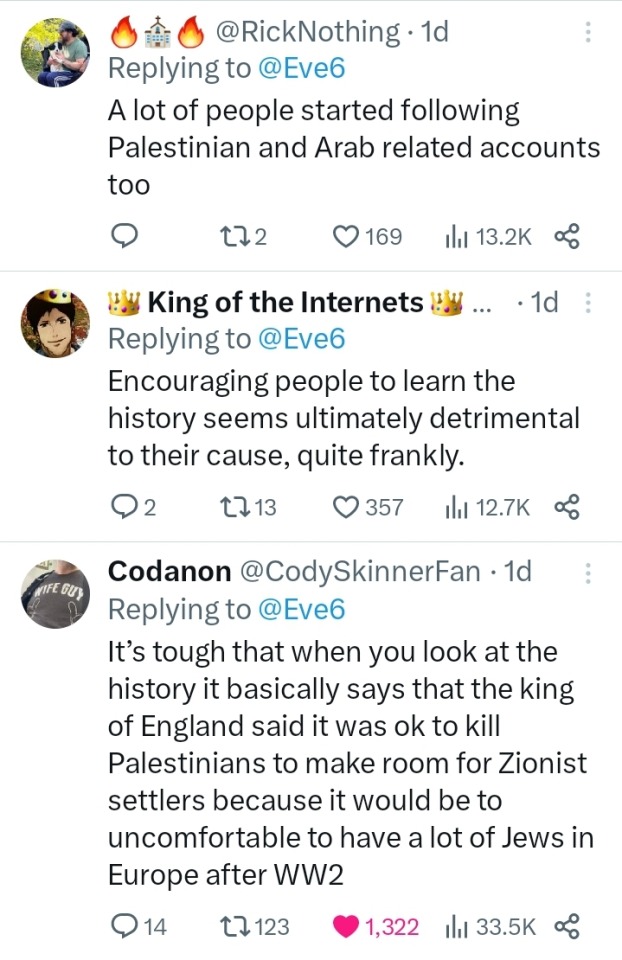
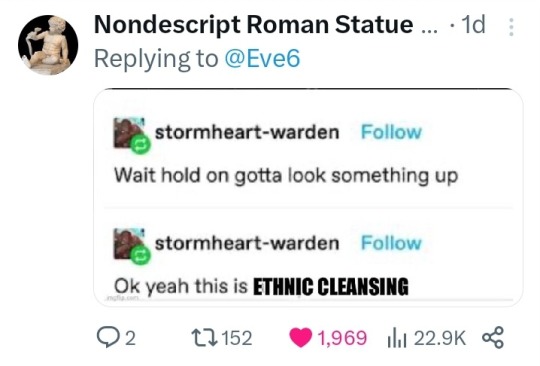
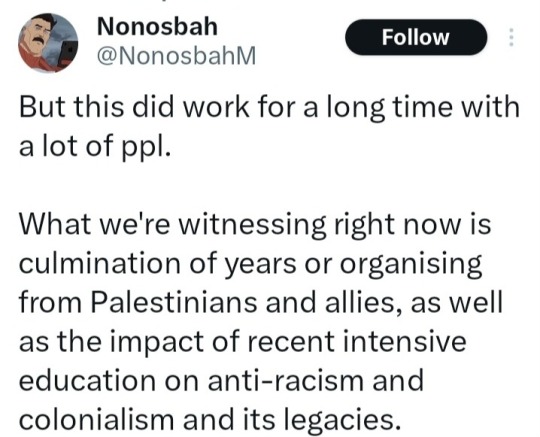
The Big Damn List Of Stuff They Said You Didn't Know
(Yes, it's a lot. Just choose your preferred medium and then pick one.)
Podcasts
Backgrounders and Quick Facts
Interactive Maps
Teach-Out Resources
Reading Material (free)
Films and Documentaries (free)
Non-Governmental Organizations
Social Media
How You Can Help
Podcasts
Cocktails & Capitalism: The Story of Palestine Part 1, Part 3
It Could Happen Here: The Cheapest Land is Bought with Blood, Part 2, The Balfour Declaration
Citations Needed: Media narratives and consent manufacturing around Israel-Palestine and the Gaza Siege
The Deprogram: Free Palestine, ft. decolonizatepalestine.com.
Backgrounders and Quick Facts
The Palestine Academy: Palestine 101
Institute for Middle East Understanding: Explainers and Quick Facts
Interactive Maps
Visualizing Palestine
Teach-Out Resources
1) Cambridge UCU and Pal Society
Palestine 101
Intro to Palestine Film + Art + Literature
Resources for Organising and Facilitating)
2) The Jadaliya YouTube Channel of the Arab Studies Institute
Gaza in Context Teach-in series
War on Palestine podcast
Updates and Discussions of news with co-editors Noura Erakat and Mouin Rabbani.
3) The Palestine Directory
History (virtual tours, digital archives, The Palestine Oral History Project, Documenting Palestine, Queering Palestine)
Cultural History (Palestine Open Maps, Overdue Books Zine, Palestine Poster Project)
Contemporary Voices in the Arts
Get Involved: NGOs and campaigns to help and support.
3) PalQuest Interactive Encyclopedia of the Palestine Question.
4) The Palestine Remix by Al Jazeera
Books and Articles
Free reading material
My Gdrive of Palestine/Decolonization Literature (nearly all the books recommended below + books from other recommended lists)
Five free eBooks by Verso
Three Free eBooks on Palestine by Haymarket
LGBT Activist Scott Long's Google Drive of Palestine Freedom Struggle Resources
Recommended Reading List
Academic Books
Edward Said (1979) The Question of Palestine, Random House
Ilan Pappé (2002)(ed) The Israel/Palestine Question, Routledge
Ilan Pappé (2006) The Ethnic Cleansing of Palestine, OneWorld Publications
Ilan Pappé (2011) The Forgotten Palestinians: A History of the Palestinians in Israel, Yale University Press
Ilan Pappé (2015) The Idea of Israel: A History of Power and Knowledge, Verso Books
Ilan Pappé (2017) The Biggest Prison On Earth: A History Of The Occupied Territories, OneWorld Publications
Ilan Pappé (2022) A History of Modern Palestine, Cambridge University Press
Rosemary Sayigh (2007) The Palestinians: From Peasants to Revolutionaries, Bloomsbury
Andrew Ross (2019) Stone Men: the Palestinians who Built Israel, Verso Books
Rashid Khalidi (2020) The Hundred Years’ War on Palestine: A History of Settler Colonialism and Resistance 1917–2017
Ariella Azoulay (2011) From Palestine to Israel: A Photographic Record of Destruction and State Formation, 1947-1950, Pluto Press
Ariella Azoulay and Adi Ophir (2012) The One-State Condition: Occupation and Democracy in Israel/Palestine, Stanford University Press.
Jeff Halper (2010) An Israeli in Palestine: Resisting Dispossession, Redeeming Israel, Pluto Press
Jeff Halper (2015) War Against the People: Israel, the Palestinians and Global Pacification
Jeff Halper (2021) Decolonizing Israel, Liberating Palestine: Zionism, Settler Colonialism, and the Case for One Democratic State, Pluto Press
Anthony Loewenstein (2023) The Palestine Laboratory: How Israel exports the Technology of Occupation around the World
Noura Erakat (2019) Justice for Some: Law and the Question of Palestine, Stanford University Press
Neve Gordon (2008) Israel’s Occupation, University of California Press
Joseph Massad (2006) The Persistence of the Palestinian Question: Essays on Zionism and the Palestinians, Routledge
Memoirs
Edward Said (1986) After the Last Sky: Palestine Lives, Columbia University PEdward Saidress
Edward Said (2000) Out of Place; A Memoir, First Vintage Books
Mourid Barghouti (2005) I saw Ramallah, Bloomsbury
Hatim Kanaaneh (2008) A Doctor in Galilee: The Life and Struggle of a Palestinian in Israel, Pluto Press
Raja Shehadeh (2008) Palestinian Walks: Into a Vanishing Landscape, Profile Books
Ghada Karmi (2009) In Search of Fatima: A Palestinian Story, Verso Books
Vittorio Arrigoni (2010) Gaza Stay Human, Kube Publishing
Ramzy Baroud (2010) My Father Was a Freedom Fighter: Gaza's Untold Story, Pluto Press
Izzeldin Abuelaish (2011) I Shall Not Hate: A Gaza Doctor’s Journey on the Road to Peace and Human Dignity, Bloomsbury
Atef Abu Saif (2015) The Drone Eats with Me: A Gaza Diary, Beacon Press
Anthologies
Voices from Gaza - Insaniyyat (The Society of Palestinian Anthropologists)
Letters From Gaza • Protean Magazine
Salma Khadra Jayyusi (1992) Anthology of Modern Palestinian Literature, Columbia University Press
ASHTAR Theatre (2010) The Gaza Monologues
Refaat Alreer (ed) (2014) Gaza Writes Back, Just World Books
Refaat Alreer, Laila El-Haddad (eds) (2015) Gaza Unsilenced, Just World Books
Cate Malek and Mateo Hoke (eds)(2015) Palestine Speaks: Narrative of Life under Occupation, Verso Books
Jehad Abusalim, Jennifer Bing (eds) (2022) Light in Gaza: Writings Born of Fire, Haymarket Books
Short Story Collections
Ghassan Kanafani, Hilary Kilpatrick (trans) (1968) Men in the Sun and Other Palestinian Stories, Lynne Rienner Publishers
Ghassan Kanafani, Barbara Harlow, Karen E. Riley (trans) (2000) Palestine’s Children: Returning to Haifa and Other Stories, Lynne Rienner Publishers
Atef Abu Saif (2014) The Book of Gaza: A City in Short Fiction, Comma Press
Samira Azzam, Ranya Abdelrahman (trans) (2022) Out Of Time: The Collected Short Stories of Samira Azzam
Sonia Sulaiman (2023) Muneera and the Moon; Stories Inspired by Palestinian Folklore
Essay Collections
Edward W. Said (2000) Reflections on Exile and Other Essays, Harvard University Press
Salim Tamari (2008) Mountain against the Sea: Essays on Palestinian Society and Culture, University of California Press
Fatma Kassem (2011) Palestinian Women: Narratives, histories and gendered memory, Bloombsbury
Ramzy Baroud (2019) These Chains Will Be Broken: Palestinian Stories of Struggle and Defiance in Israeli Prisons, Clarity Press
Novels
Sahar Khalifeh (1976) Wild Thorns, Saqi Books
Liyana Badr (1993) A Balcony over the Fakihani, Interlink Books
Hala Alyan (2017) Salt Houses, Harper Books
Susan Abulhawa (2011) Mornings in Jenin, Bloomsbury
Susan Abulhawa (2020) Against the Loveless World, Bloomsbury
Graphic novels
Joe Sacco (2001) Palestine
Joe Sacco (2010) Footnotes in Gaza
Naji al-Ali (2009) A Child in Palestine, Verso Books
Mohammad Sabaaneh (2021) Power Born of Dreams: My Story is Palestine, Street Noise Book*
Poetry
Fady Joudah (2008) The Earth in the Attic, Sheridan Books,
Ghassan Zaqtan, Fady Joudah (trans) (2012) Like a Straw Bird It Follows Me and Other Poems, Yale University Press
Hala Alyan (2013) Atrium: Poems, Three Rooms Press*
Mohammed El-Kurd (2021) Rifqa, Haymarket Books
Mosab Abu Toha (2022) Things You May Find Hidden in My Ear: Poems from Gaza, City Lights Publishers
Tawfiq Zayyad (2023) We Are Here to Stay, Smokestack Books*
The Works of Mahmoud Darwish
Poems
Rafeef Ziadah (2011) We Teach Life, Sir
Nasser Rabah (2022) In the Endless War
Refaat Alareer (2011) If I Must Die
Hiba Abu Nada (2023) I Grant You Refuge/ Not Just Passing
[All books except the ones starred are available in my gdrive. I'm adding more each day. But please try and buy whatever you're able or borrow from the library. Most should be available in the discounted Free Palestine Reading List by Pluto Press, Verso and Haymarket Books.]
Human Rights Reports & Documents
Information on current International Court of Justice case on ‘Legal Consequences arising from the Policies and Practices of Israel in the Occupied Palestinian Territory, including East Jerusalem’
UN Commission of Inquiry Report 2022
UN Special Rapporteur Report on Apartheid 2022
Amnesty International Report on Apartheid 2022
Human Rights Watch Report on Apartheid 2021
Report of the United Nations Fact-Finding Mission on the Gaza Conflict’ 2009 (‘The Goldstone Report’)
Advisory Opinion on the Legal Consequences of the Construction of a Wall in the Occupied Palestinian Territory, International Court of Justice, 9 July 2004
Films
Documentaries
Jenin, Jenin (2003) dir. Mohammed Bakri
Massacre (2005) dir. Monica Borgmann, Lokman Slim, Hermann Theissen
Slingshot HipHop (2008) dir. Jackie Reem Salloum
Waltz with Bashir (2008) dir. Ari Folman † (also on Amazon Prime)
Tears of Gaza (2010) dir. Vibeke Løkkeberg (also on Amazon Prime)
5 Broken Cameras (2011) dir. Emad Burnat (also on Amazon Prime)
The Gatekeepers (2012) dir. Dror Moreh (also on Amazon Prime)
The Great Book Robbery (2012) | Al Jazeera English
Al Nakba (2013) | Al Jazeera (5-episode docu-series)
The Village Under the Forest (2013) dir. Mark J. Kaplan
Where Should The Birds Fly (2013) dir. Fida Qishta
Naila and the Uprising (2017) (also on Amazon Prime)
GAZA (2019) dir. Andrew McConnell and Garry Keane
Gaza Fights For Freedom (2019) dir. Abby Martin
Little Palestine: Diary Of A Siege (2021) dir. Abdallah Al Khatib
Palestine 1920: The Other Side of the Palestinian Story (2021) | Al Jazeera World Documentary
Gaza Fights Back (2021) | MintPress News Original Documentary | dir. Dan Cohen
Innocence (2022) dir. Guy Davidi
Short Films
Fatenah (2009) dir. Ahmad Habash
Gaza-London (2009) dir. Dina Hamdan
Condom Lead (2013) dir. Tarzan Nasser, Arab Nasser
OBAIDA (2019) | Defence for Children Palestine
Theatrical Films
Divine Intervention (2002) | dir. Elia Suleiman (also on Netflix)
Paradise Now (2005) dir Hany Abu-Assad (also on Amazon Prime)
Lemon Tree (2008) (choose auto translate for English subs) (also on Amazon Prime)
It Must Be Heaven (2009) | dir. Elia Suleiman †
The Promise (2010) mini-series dir. Peter Kosminsky (Part 1, Part 2, Part 3, Part 4)
Habibi (2011)* dir. Susan Youssef
Omar (2013)* dir. Hany Abu-Assad †
3000 Nights (2015)* dir. Mai Masri
Foxtrot (2017) dir. Samuel Maoz (also on Amazon Prime)
The Time that Remains (2019) dir. Elia Suleiman †
Gaza Mon Amour (2020) dir. Tarzan Nasser, Arab Nasser †
The Viewing Booth (2020) dir. Ra'anan Alexandrowicz (on Amazon Prime and Apple TV)
Farha (2021)* | dir. Darin J. Sallam
Palestine Film Institute Archive
All links are for free viewing. The ones marked with a star (*) can be found on Netflix, while the ones marked † can be downloaded for free from my Mega account.
If you find Guy Davidi's Innocence anywhere please let me know, I can't find it for streaming or download even to rent or buy.
In 2018, BDS urged Netflix to dump Fauda, a series created by former members of IOF death squads that legitimizes and promotes racist violence and war crimes, to no avail. Please warn others to not give this series any views. BDS has not called for a boycott of Netflix. ]
Planning to link two separate posts here listing all the books in my drive and all the films I couldn't include here. Check back for updates.
NGOs
The Boycott, Divestment, Sanctions (BDS) Movement
Medical Aid for Palestinians
Euro-Mediterranean Human Rights Monitor
Palestine Defence for Children International
Palestinian Feminist Collective
Al-Shabaka: The Palestinian Policy Network
Addameer Prisoner Support and Human Rights Association
Institute for Palestine Studies
Al Haq
Artists for Palestine
The Palestine Museum
Jewish Currents
B’Tselem
DAWN
Social Media
Palestnians on Tumblr
@el-shab-hussein
@killyfromblame
@apollos-olives
@fairuzfan
@palipunk
@sar-soor
@nabulsi
@ibtisams
@wearenotjustnumbers2
@90-ghost (is in Gaza right now. Please donate to his GFM and boost it.)
@tamarrud
Allies and advocates (not Palestinian)
@bloglikeanegyptian beautiful posts that read like op-eds
@vyorei daily news roundups
@luthienne resistance through prose
@decolonize-the-left scoop on the US political plans and impacts
@feluka
(Please don't expect any of these blogs to be completely devoted to Palestine allyship; they do post regularly about it but they're still personal blogs and post whatever else they feel like. Do not harrass them.)
Gaza journalists
Motaz Azaiza IG: @motaz_azaiza | Twitter: @azaizamotaz9 | TikTok: _motaz.azaiza (left Gaza as of Jan 23)
Bisan Owda IG and TikTok: wizard_bisan1 | Twitter: @wizardbisan
Saleh Aljafarawi IG: @saleh_aljafarawi | Twitter: @S_Aljafarawi | TikTok: @saleh_aljafarawi97
Plestia Alaqad IG: @byplestia | TikTok: @plestiaaqad (left Gaza)
Wael Al-Dahdouh IG: @wael_eldahdouh | Twitter: @WaelDahdouh (left Gaza as of Jan 13)
Hind Khoudary IG: @hindkhoudary | Twitter: @Hind_Gaza
Ismail Jood IG and TikTok: @ismail.jood (announced end of coverage on Jan 25)
Yara Eid IG: @eid_yara | Twitter: @yaraeid_
Eye on Palestine IG: @eye.on.palestine | Twitter: @EyeonPalestine | TikTok: @eyes.on.palestine
Muhammad Shehada Twitter: @muhammadshehad2
(Edit: even though some journos have evacuated, the footage up to the end of their reporting is up on their social media, and they're also doing urgent fundraisers to get their families and friends to safety. Please donate or share their posts.)
News organisations
The Electronic Intifada Twitter: @intifada | IG: @electronicintifada
Quds News Network Twitter and Telegram: @QudsNen | IG: @qudsn (Arabic)
Times of Gaza IG: @timesofgaza | Twitter: @Timesofgaza | Telegram: @TIMESOFGAZA
The Palestine Chronicle Twitter: @PalestineChron | IG: @palestinechron | @palestinechronicle
Al-Jazeera Twitter: @AJEnglish | IG and TikTok: @aljazeeraenglish, @ajplus
Middle East Eye IG and TikTok: @middleeasteye | Twitter: @MiddleEastEye
Democracy Now Twitter and IG: @democracynow TikTok: @democracynow.org
Haaretz* Twitter: @Haaretz | IG: haaretzcom
Mondoweiss IG and TikTok: @mondoweiss | Twitter: @Mondoweiss
The Intercept Twitter and IG: @theintercept
MintPress Twitter: @MintPressNews | IG: mintpress
Novara Media Twitter and IG: @novaramedia
Truthout Twitter and IG: @truthout
[*Please note that Haaretz is an Israeli Liberal Zionist newspaper and heavily propagandized against Palestine. It's included here only as a Zionist critic of the Israeli government and IDF from within Israel.]
Palestnians on Other Social Media
Mouin Rabbani: Middle East analyst specializing in the Arab-Israeli conflict and Palestinian affairs. Twitter: @MouinRabbani
Noura Erakat: Legal scholar, human rights attorney, specialising in Israeli–Palestinian conflict. Twitter: @4noura | IG: @nouraerakat | (http://www.nouraerakat.com/)
Hebh Jamal: Journalist in Germany. IG and Twitter: @hebh_jamal
Ghada Sasa: PhD candidate in International Relations, green colonialism, and Islam in Canada. Twitter: @sasa_ghada | IG: @ghadasasa48
Taleed El Sabawi: Assistant professor of law and researcher in public health. Twitter: @el_sabawi | IG
Lexi Alexander: Filmmaker and activist. Twitter: @LexiAlex | IG: @lexialexander1
Mariam Barghouti: Writer, blogger, researcher, and journalist. Twitter: @MariamBarghouti | IG: @mariambarghouti
Rasha Abdulhadi: Queer poet, author and cultural organizer. Twitter: @rashaabdulhadi
Mohammed el-Kurd: Writer and activist from Jerusalem. IG: @mohammedelkurd | Twitter: @m7mdkurd
Ramy Abdu: Founder and Chairman of the Euro-Mediterranean Human Rights Monitor. Twitter: @RamyAbdu
Subhi: Founder of The Palestine Academy website. IG: @sbeih.jpg |TikTok @iamsbeih | Twitter: @iamsbeih
Allies
Lowkey (Kareem Dennis): Rapper, activist, video and podcast host for MintPress. Twitter: @LowkeyOnline IG: @lowkeyonline
Francesca Albanese: UN Special Rapporteur on the Occupied Territories. Twitter: @FranceskAlbs
Sana Saeed: Journalist and media critic, host and senior producer at Al-Jazeera Plus. IG: @sanaface | Twitter: @SanaSaeed
Shailja Patel: Poet, playwright, activist, founding member of Kenyans For Peace, Truth and Justice. Twitter: @shailjapatel
Jairo I. Fúnez-Flores: Researcher in curriculum studies, decolonial theory, social movements. Twitter: @Jairo_I_Funez
Jack Dodson: Journalist and Filmmaker. Twitter: @JackDodson IG: @jdodson4
Imani Barbarin: Writer, public speaker, and disability rights activist. IG: @crutches_and_spice | Twitter: @Imani_Barbarin | TikTok: @crutches_and_spice
Jewish Allies
Katie Halper: US comedian, writer, filmmaker, podcaster, and political commentator. IG and Twitter: @kthalps
Amanda Gelender: Writer. Twitter: @agelender | (https://agelender.medium.com/)
Yoav Litvin: Jerusalem-born Writer and Photographer. IG and Twitter: @nookyelur | (yoavlitvin.com)
Alana Lentin: Professor of Cultural and Social Analysis at Western Sydney University. Twitter: @alanalentin
Gideon Levy: anti-Zionist Israeli journalist and activist. Twitter: @gideonle
How You Can Help Palestine
How to be an Ally 101
URGENT‼️📢: Global Strike Guide
If any links are broken let me know. Or pull up the current post to check whether it's fixed.
"Knowledge is Israel's worst enemy. Awareness is Israel's most hated and feared foe. That's why Israel bombs a university: it wants to kill openness and determination to refuse living under injustice and racism."
— Dr. Refaat Alareer, (martyred Dec 6, 2023)
From River To The Sea Palestine Will Be Free 🇵🇸🇵🇸🇵🇸
-----
Edit 1: took the first video down because turns out the animator is a terf and it links to her blog. Really sorry for any distress.
Edit 2: All recommended readings + Haymarket recommendations + essential decolonization texts have been uploaded to my linked gdrive. I will adding more periodically. Please do buy or check them out from the library if possible, but this post was made for and by poor and gatekept Global South bitches like me.
Some have complained about the memes being disrespectful. You're actually legally obligated to make fun of Israeli propaganda and Zionists. I don't make the rules.
Edit 3: "The river to the sea" does not mean the expulsion of Jews from Palestine. Believing that is genocide apologia.
Edit 4: Gazans have specifically asked us to put every effort into pushing for a ceasefire instead of donations. "Raising humanitarian aid" is a grift Western governments are pushing right now to deflect from the fact that they're sending billions to Israel to keep carpet bombing Gazans. As long as the blockades are still in place there will never be enough aid for two million people. (UPDATE: PLEASE DONATE to the Gazan's GoFundMe fundraisers to help them buy food and get out of Rafah into Egypt. E-SIMs, food and medical supplies are also essential. Please donate to the orgs linked in the How You Can Help. Go on the strikes. DO NOT STOP PROTESTING.)
Edit 5: Google drive link for academic books folder has been fixed. Also have added a ton of resources to all the other folders so please check them out.
Edit 6: Added interactive maps, Jadaliya channel, and masterlists of donation links and protest support and of factsheets.
The twitter accounts I reposted as it was given to me and I just now realized it had too many Israeli voices and almost none of the Palestinians I'm following, so it's being edited. Check back for more. I also removed sources like Jewish Voices of Peace and Breaking the Silence that do good work but have come under fair criticism from Palestinians.
Edit 7: Complete reformatting
Edit 8: Complete revamping of the social media section. It now reflects my own following list.
Edit 9: removed some more problematic people from the allies list. Remember that the 2SS is a grift that's used to normalize violence and occupation, kids. Supporting the one-state solution is lowest possible bar for allyship. It's "Free Palestine" not "Free half of Palestine and hope Israel doesn't go right back to killing them".
Edit 10: added The Palestine Directory + Al Jazeera documentary + Addameer. This "100 links per post" thing sucks.
Edit 11: more documentaries and films
Edit 12: reformatted reading list
Edit 13: had to remove @palipunk's masterlist to add another podcast. It's their pinned post and has more resources Palestinian culture and crafts if you want to check it out
#free palestine#palestine resources#palestine reading list#decolonization#israel palestine conflict#israel palestine war#british empire#american imperialism#apartheid#social justice#middle east history#MENA#arab history#anti zionism#palestinian art#palestinian history#palestinian culture#palestinian genocide#al nakba#ethnic cleansing#war crimes#racism#imperialism#colonialism#british colonialism#knee of huss#ask to tag#Youtube
72K notes
·
View notes
Text
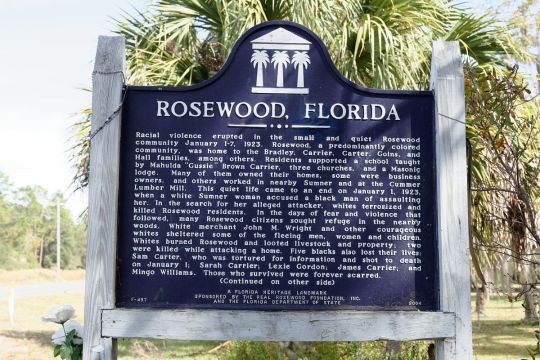
(LONG POST) Column: The story behind that Florida school curriculum that whitewashed slavery keeps getting worse
By Michael Hiltzik, LATimes Business Columnist
(Photo) Marker commemorating the Rosewood massacre of 1923: Can Florida escape its racist past? (Historical Marker Database)
If there’s a bet that you will almost always win, it’s that no matter how crass and dishonest a right-wing claim may seem to be, the reality will be worse.
That’s the case with Florida’s effort to whitewash the truth about slavery via a set of standards for teaching African American history imposed on the state’s public school teachers and students.
The curriculum, you may recall, was condemned for a provision that the curriculum cover “how slaves developed skills which, in some instances, could be applied for their personal benefit.”
"Dogs and Negroes Not Welcome"
— Sign posted until 1959 at the town line of Ocoee, Florida, site of a 1920 racial massacre
Another provision seemed to blame “Africans’ resistance to slavery” for the tightening of slave codes in the South that outlawed teaching slaves to read and write.
A section referring to “acts of violence perpetrated against and by African Americans” goes on to list five race riots and massacres from American history, every one of which was started by whites.
More on that in a moment. As the indispensable Charles P. Pierce put it, the Florida standards “look as though they were devised by Strom Thurmond on some very good mushrooms.”
I reported last week on this reprehensible project, which was publicly presented as the product of a work group of the state’s African American History Task Force.
Two members of the task force, William B. Allen and Frances Presley Rice, responded to the scathing reaction to the curriculum from Democrats and Republicans with a defensive statement purportedly on behalf of the entire work group.
“Some slaves developed highly specialized trades from which they benefitted [sic],” the statement read. “This is factual and well documented.”
As I reported, however, of the 16 individuals Allen and Rice mentioned to support their assertion, nine never were slaves, seven were identified by the wrong trade and 13 or 14 did not learn their skills while enslaved. One, Betty Washington Lewis, whom Allen and Rice identified as a “shoemaker,” was white: She was George Washington’s younger sister and a slave owner.
Now it turns out that Allen and Rice were not speaking for the work group, but for themselves. Thanks to reporting by NBC News, we know that most of the work group’s 13 members opposed the language suggesting that slaves benefited from their enslavement.
NBC quoted several members anonymously as stating that two members pushed the provision — Allen and Rice. Members “questioned ‘how there could be a benefit to slavery,’” one work group member told NBC.
Others said that the work group met intermittently over the internet and did not collaborate with the state’s African American History Task Force, which was created in 1994 to oversee the curriculum for African American studies in Florida’s K-12 schools.
The work group’s standards were approved unanimously on July 19 by the state board of education, every member of which was appointed by Gov. Ron DeSantis, who is running a natural experiment to see whether bigotry and racism can carry someone to the presidency.
We’ve recently learned more about Allen and Rice. Allen, as I reported earlier, is a retired professor of political science at Michigan State University. (The university removed his bio page from its website sometime in the last few days, but here’s an archived version.)
Allen served as chair of the U.S. Commission on Civil Rights under George H.W. Bush, but angered civil rights activists and members of the commission itself for taking a stand against legal protections for gay people.
At a 1989 conference in Anaheim sponsored by anti-gay Christian fundamentalists, Allen delivered a talk titled, “Blacks? Animals? Homosexuals? What is a Minority?”
Its theme was that treating gays and Black people as distinct minorities would relegate them to animal status. Allen said, “My title is as innocent as a title can be,” a position that prefigured his current defense of the Florida slavery standards as no big deal.
He’s listed as a fellow of the Claremont Institute, which has been funded by a galaxy of right-wing foundations. The institute lists among its senior fellows John Eastman, who is one of the four attorneys identified as “co-conspirators” in the federal indictment of former President Trump for trying to overturn the 2020 presidential election, handed up Tuesday. Eastman is also the target of a California State Bar proceeding aimed at his disbarment for his alleged role in that effort.
As for Rice, she’s chair of the Sarasota-based National Black Republican Assn., which appears to have shared its business address with her home address. She identifies herself as “Dr. Frances Presley Rice,” but she doesn’t appear to have a medical degree or PhD; she does hold a juris doctor degree, but that’s just a law degree and doesn’t customarily bestow the “Dr.” designation on its holders.
Rice has conducted a years-long campaign to associate today’s Democratic Party with the Democrats of the 19th century, a pro-slavery party that shares none of its positions on Blacks or slavery with the Democrats of modern times.
The normalization of Florida’s slavery whitewash has been abetted by a supine press. On July 27, for example, Steve Inskeep, the host of NPR’s Morning Edition, conducted a servile interview in which he sat meekly by as Allen spewed unalloyed hogwash.
When Allen suggested that Black journalist Ida B. Wells had drawn “inspiration” from the slavery experience, Inskeep — had he been even minimally prepared — could have pointed out that the Mississippi-born Wells was 5½ months old when the Emancipation Proclamation took effect on Jan. 1, 1863, and 3½ years old when the 13th Amendment abolished slavery.
Nor did Inskeep challenge Allen about the list of 16 supposed slaves that he and Rice issued in defense of their curriculum. The list had been out for a full week before the NPR interview. Inskeep didn’t mention it at all.
When Allen asserted that he was not the author of the curriculum, nor were any other members of the work group, the proper follow-up would have been: “Who wrote it, then?” Inskeep kept mum.
The Washington Post, meanwhile, tried to shoehorn Florida’s whitewashing of slavery into a “both-sides-do-it” framework.
The Post article suggests that the Florida curriculum and President Biden’s July 25 proclamation of a national monument dedicated to Emmett Till, a Black teenager tortured and lynched by a white mob in Mississippi in 1955 for purportedly offending a white woman, are two sides of a “roiling debate” over Black history.
Of course that’s absurd. Most Americans, and most Democrats, don’t see slavery as a topic worthy of reconsideration. That’s all on the Republican side, especially in Florida.
DeSantis and his stooges are pretending that the truth about America’s racist past should be suppressed for fear of making white children feel bad. It’s nothing but a play for the most bigoted members of the GOP base.
That brings us back to Florida’s curriculum. Provisions other than the one about the benefits of slavery aren’t getting the attention they deserve.
Take the part about “acts of violence perpetrated against and by African Americans.” This standard is illustrated in the text by references to race riots in Atlanta in 1906 and Washington, D.C., in 1919, and massacres in Ocoee, Fla. (1920); Tulsa (1921); and Rosewood, Fla. (1923) — rampages by white mobs lasting a day or more.
In what sense do these point to violence perpetrated by Black people? Pierce conjectures that they “might distressingly be referring to attempts by the victims of those bloody episodes to fight back.”
The Ocoee massacre occurred when the town’s Black residents attempted to vote. When a squadron of Klansmen hunted down a Black leader in his home, his daughter tried to prevent them from taking him by brandishing a rifle, which went off, slightly wounding a white member of the gang.
“A volley of gunfire erupted in both directions,” according to an account on the Florida History blog. In the aftermath, nearly 60 Black residents were dead, their community was razed to the ground, and those who survived were driven from the town, never to return. Until 1959, a sign at the town line read, “Dogs and Negroes Not Welcome.”
Is Ocoee supposed to be an example of “violence perpetrated ... by African Americans”? Nothing would speak more eloquently to the true nature of the Florida standards for teaching Black history.
#florida#rhonda santis#education#racists#white supremacy#history#florida man#history of racism#racist then and racist now#ron desantis#republicans#racist and bigoted republican base of voters#florida standards for teaching black history#refrigerator magnet#for educational purposes only
0 notes
Text
can't do this one as a poll bc there's endless choices but if you're in college/university or went to college/university what's been the most fun/enriching class you've had?
#for me it wasn't fun but the most enriching one I've had was the history of racism#learned a ton in that class#I also really did enjoy my history of american religion course even though the professor was a tough grader#he shattered my ego a couple times lmfao
10K notes
·
View notes
Text
i just rbed a post about something similar but. i need my white disabled to folks to be more aware of the privileges they have when navigating the healthcare system. every bit of medical ableism one can experience can be made even worse by being a poc. some of us can't threaten to report a doctor to the ethics board, or refuse care from healthcare workers who aren't masking, without jeopardizing our access to care in general or even our physical safety. we are more likely to be seen as drug seeking, or marked as noncompliant, or experience medical abuse and neglect. that's not to say these things don't happen to white disabled people, but i just think it's important to recognize how dangerous receiving medical care can be for disabled poc specifically. please keep this in mind when giving advice on navigating healthcare.
#mj.txt#disabled#disabled poc#black history month#cripple punk#medical ableism#medical racism#medical abuse#lots of tags sorry
5K notes
·
View notes
Text
Okay, so: in early drafts of Jules Verne's 1870 novel Twenty Thousand Leagues Under the Sea, Captain Nemo is a Polish guy bent on revenge against the Russian Empire for the murder of his family in the January Uprising. Verne's editor objected on the grounds that Russia was a French ally at the time of the book's writing, and in the actual, published version of the story, Nemo's national origin and precisely which empire he's pissed off at are left unspecified.
Later, in the 1875 quasi-sequel The Mysterious Island, Nemo is retconned as an Indian noble out for revenge against the British for the murder of his family in the Indian Rebellion of 1857 – basically the same as the original plan, simply substituting a different uprising and a different empire. Verne's editor raised no objections this time around, because fuck the British, right? Though Twenty Thousand Leagues and The Mysterious Island aren't 100% compatible in their respective timelines, this version of Nemo has customarily been back-ported into adaptations of Twenty Thousand Leagues ever since.
Now here's the funny part: perhaps as a jab at his editor, Verne made a specific plot point in Twenty Thousand Leagues of Professor Aronnax repeatedly trying and failing to figure out where the fuck Nemo is from. At one point his attempt to pin down Nemo's accent is frustrated by Nemo's vast multilingualism. At another point, he tries and fails to trick Nemo by quizzing him about latitude and longitude.
(To contextualise that last bit, at the time the book was written, there was no international agreement on which line of longitude should be zero degrees, and many nations had their own prime meridians; Aronnax hoped to identify Nemo's national origin by calculating which meridian he was giving his longitudes relative to. Nemo, however, immediately spots the ploy, and announces that he'll use the Paris meridian in deference to the fact that Aronnax is a Frenchman.)
The upshot is that at no point in the course of any of this Sherlock Holmes bullshit does Aronnax ever bring up the colour of Nemo's skin as a potential clue. In light of the book's publication history, this is almost certainly simply because Verne hadn't decided that Nemo was Indian yet. However, taking into account The Mysterious Island's retcon, it retroactively makes Aronnax the least racist Frenchman ever.
#media#literature#twenty thousand leagues under the seas#captain nemo#jules verne#writing#history#metatextual wankery#violence mention#death mention#racism mention#swearing#twenty thousand leagues under the sea spoilers#the mysterious island spoilers#spoilers
11K notes
·
View notes
Note
Okay – so! Thank you for all that you do for fandom and The History side of tumblr- it’s a LOT.
I’m struggling with mapping a historical accuracy/fanon vs. canon concept. I hope you can help me untangle my thoughts on this. Diverse representation in media is very important to me; and I’m also aware of the damage that the ‘colour-blind’ casting can do.
So! I’m trying to reconcile a common fandom perception that Hob Gadling is of South-East Asian decent. (I know that Ferdie is!- I also have seen zero evidence that he claims Desi Diaspora as part of his identity. It makes me really uncomfortable that fandom might be projecting their desire for ‘Representation’ onto a man who lives outside his ancestral culture.)
What I do know is that Hob is a medieval freeman (?) from the south of England in the 1300s. I wonder at the possibility of his CHARACTER being of mixed race? I know that Briton and Europe and Africa were in trade. I know that People of colour moved freely around the continents!
I’ve done some research into London population polls from the time, but I’m not certain of their degree of accuracy/usefulness. They describe immigrants as ‘aliens’.. and most I’ve seen are European. I haven’t even come across evidence of Muslim or ‘Moorish’ people settling in London???!
The written history I’ve read tells me the Europeans didn’t establish trade with India until the mid 1400s. (How it’s possible they didn’t know about each other is Baffling and seems impossible??) Anyway.
The crux of the matter is: would Hob Gadling possibly been of mixed heritage?
I mean yes, technically, he COULD be. The most logical route for that would be to give him some family heritage from somewhere in Spain, or Iberia, which was a fully mixed-race society until well into the 13th/14th century, and was in regular trade and communication with England. The medieval Iberian Christian kingdoms of Castile-León, Aragon, and Navarre particularly were close trading partners and English/Iberian royalty married each other fairly often. It was somewhat less the case by the time Hob was born in the 1350s, but there is certainly enough previous contact to make it feasible. Muslims, Christians, and Jews all lived in Iberia (how much they all co-existed has long been one of the most debated questions in religious/historical studies), and Muslims had a presence in Spain for over 700 years, since the first arrivals in 711 CE following the collapse of the Umayyad dynasty in Baghdad, until their final expulsion under Ferdinand and Isabella in 1492.
The question, however, is if he SHOULD be headcanoned or identified as mixed-race, and while I am the least fandom-policey person ever and respect people's right to enjoy their own ideas in peace, it personally makes me a little uncomfortable. It feels related to the "fandom activism!" mindset where you should ship a more Morally Pure OTP, or your favorite is "better" if they can be somehow identified with a marginalized group, regardless of whether this fits or makes sense for the character. And in this case, Hob’s background as a good-looking white British bloke with an appropriately English-sounding name, as I describe him in AITWW, is central to both his character arc, his major mistakes, and how he has to learn and grow over time. It was absolutely vital to me that in AITWW, he had to explicitly confront the massive amounts of unearned privilege that he enjoyed over the centuries by being born into that body, and how it would be very different for him if he hadn't been. As his friend Julia puts it in their discussion in chapter 13, he had the luck to be born into a body that society automatically privileges and values and places into positions of power whether or not he deserves it, and as a black woman, she thinks immortality sounds absolutely awful. Why would she want to put up with the absolute shit it would be to live 600 years, at least in the Western world/America/Europe, in that embodiment?
Likewise, Hob agrees and admits that of course it's easy for him to want to live forever and maintain enthusiasm for life, because whatever difficulties he has faced, his race and gender have not contributed to them (which is the essence of white privilege in a nutshell). And of course, the urge to make him mixed-race might reflect some discomfort with his actual canon background and involvement in slavery, no matter if he obviously feels terribly guilty and driven to atone for over 200 years after that (as he SHOULD). In some sense, making him mixed-race might seem to mitigate that or give some reason to make him "sympathetic" while he was doing it, and frankly, I don't think 18th-century Hob deserves to get off the hook for being yet another British white man who might have felt bad about what he was doing at times, but continued to do it anyway. I'm not saying this is anyone's motive or intention, but it does trouble me, especially since Hob’s whiteness, the damage of that whiteness, and the way he has to deliberately and extensively unlearn that urge to just live life on easy mode regardless of the damage it does to others is what I find so interesting about his character. In short, if Hob was part of a racially marginalized group already, he might have made different choices, but he didn't, and now he is forced to literally live with that guilt and shame forever. He doesn't get to exonerate himself, and nor do I do it for him.
Lastly, I think this reflects a very modern and somewhat over-simplified way of thinking; to our modern and institutionally-racist-pickled brains, race is the chief category that can be explicitly constructed as Otherness, and doesn't reflect the very unclear way this was perceived and experienced in the 14th century. I.e., you note that immigrants to England "were mostly European" -- which is true, but does not reflect the dizzying array then as now, in which local, national, ethnic, and religious identities were constructed. One unattractive feature of the English national character over many centuries has been their hostility and distrust of foreigners, and this was especially the case in the 14th and especially late-14th, post-Black Plague society. For example, the Flemish were regarded as "morally inferior" since they ran several well-known brothels and red-light districts in Southwark, across the Thames from London (now part of the city), and that meant they were purveying immorality, rather than being there since the English desired their services. Xenophobia was especially rampant against "strangers" of any type, especially against Jews again post-Black Death for sadly predictable anti-Semitic reasons, and even being from continental Europe would not have made someone "English" in their eyes. Even by the Elizabethan era, it was almost impossible for a foreign-born citizen (or "denizen," meaning something akin to "permanent resident") to get licensed as a guildsman in the city of London, and without that license, you could not run a business, practice a trade, or engage in substantial paid work in any way.
Likewise, medieval notions of race were fluid, uncertain, and often linked to religion more than ethnic origin. There are several Arthurian legendarium reworkings, and epic poems such as The King of Tars, where the "happy" ending is that the mixed-race, Muslim, or black hero is converted to Christianity and abandons whatever untrue pagan religion he has been following before. This is often accompanied with a literal physical transformation turning him from black- or dark-skinned (impure) to white (pure). So yes, racial thinking and categories did exist, but it wasn't seen as fixed or unalterable, and again, wasn't really the first or primary way in which Otherness was constructed (compared to say, "Saracen," which functioned throughout almost the entire medieval era as a marker of difference and had varied racial, religious, sexual, and ethnic connotations, but originally came from the term for Muslims).
So anyway: hopefully that all makes sense and provides some context in both my historical and fandom thinking on the matter. Thanks for the question!
145 notes
·
View notes
Text
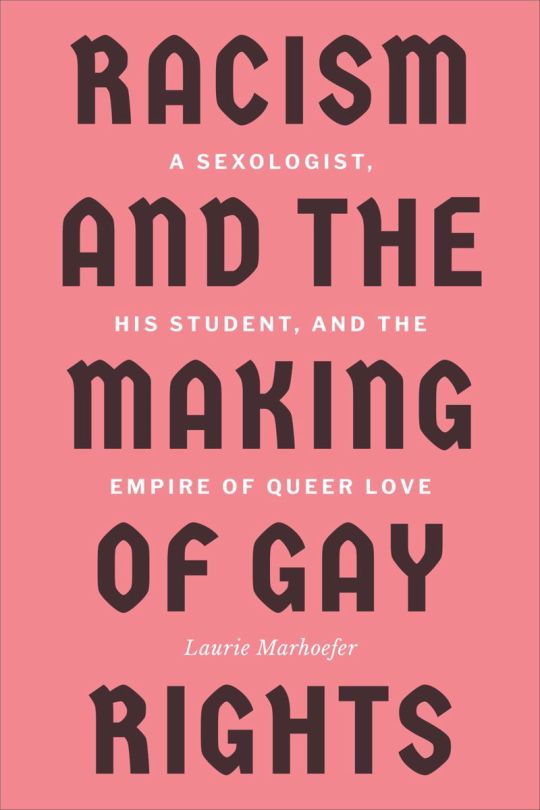
"This beautifully crafted narrative weaves together the story of the relationship of Magnus Hirschfeld and Li Shui Tong with a brilliant analysis of Hirschfeld’s complex but ultimately racist thinking about homosexuality, race, and empire. It’s hard to do justice to the power of this book. Let me just say that once you open it, you’ll have trouble tearing yourself away, and not only because you’ll want to know what happened to Li’s manuscript."
#uwlibraries#history books#uw faculty author#lgbtq history#german history#history of racism#biography
74 notes
·
View notes
Text
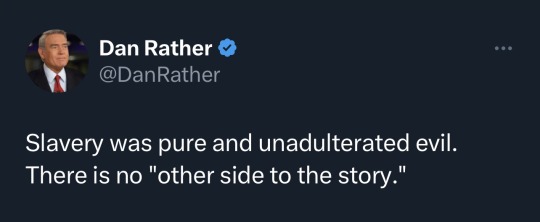
#slavery#ron desantis#jason aldean#education#politics#florida#racism deniers#whitewashing history#crt#critical race theory#dei
4K notes
·
View notes
Text
remembrance day seems like a good day to remember that in 1937 churchill rejected the arab wish to stop zionist jewish migration to palestine by saying:
I do not admit that the dog in the manger has the final right to the manger, though he may have lain there for a very long time I do not admit that right. I do not admit for instance that a great wrong has been done to the Red Indians of America or the black people of Australia. I do not admit that a wrong has been to those people by the fact that a stronger race, a higher-grade race or at any rate a more worldly-wise race, to put it that way, has come in and taken their place. I do not admit it. I do not think the Red Indians had any right to say, 'American continent belongs to us and we are not going to have any of these European settlers coming in here'. They had not the right, nor had they the power.
#fuck that guy ammarite#winston churchill#palestine#israel#history#racism#racial slurs tw#admin dominique
2K notes
·
View notes
Photo

An ob-gyn in Virginia performed unnecessary surgeries on patients for decades. He took their reproductive organs, gave them false cancer diagnoses, and did other terrible harm. When his victims learned the truth, they fought back. Issue no. 146, DAMAGES, is now available:
[Debra] requested her medical records and was stunned to find discrepancies with what Perwaiz had said to her during appointments. Most glaringly, she didn’t see any mention of precancerous cells on her cervix; the tests Perwaiz performed on her had come back normal. “If I was normal,” Debra said, “why did I have a surgery?”
There were other inconsistencies. One form from an appointment described Debra complaining of back and pelvic pain, which she told me she never did. Another document dated the day before her surgery stated that she “insisted on having those ovaries removed through the abdominal wall incision and not vaginally,” and that the “consent obtained after entirely counseling the patient [was] for abdominal hysterectomy.” In fact, she had requested the opposite surgical approach, and she recalled no such conversation with Perwaiz; the only time she’d spoken with him in the lead-up to her procedure was in passing in the hospital hallway.
Debra was sure she had a malpractice case. She went to several lawyers, but none of them would take her on as a client. “So many men—man after man saying, ‘You had a decent amount of care, and that’s all you’re afforded,’ ” she said. Frustrated, she came up with a new plan: “I said, ‘Alright, I’m going to learn how to sue this bastard myself.’ ”
#atavist journalism healthcare medicine doctors medicalmalpractice reproductivehealth racism justice virginia truestory#cancer women womenshealth history
817 notes
·
View notes